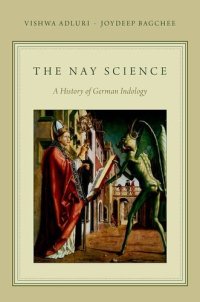
Ebook: The Nay Science: A History of German Indology
Author: Vishwa Adluri Joydeep Bagchee
- Tags: Germany, Europe, History, Hinduism, Religious, World, History, Hinduism, Chakras, Gandhi, History, Rituals & Practice, Sacred Writings, Sutras, Theology, Religion & Spirituality, Philosophy, Religious Studies, Religion & Spirituality, Europe, History, Humanities, New Used & Rental Textbooks, Specialty Boutique, Religious Studies, Buddhism, Christianity, Comparative Religion, Islam, Judaism, Religious History, Humanities, New Used & Rental Textbooks, Specialty Boutique
- Year: 2014
- Publisher: Oxford University Press
- Edition: 1
- Language: English
- pdf
The Nay Science offers a new perspective on the problem of scientific method in the human sciences. Taking German Indological scholarship on the Mahabharata and the Bhagavadgita as their example, Adluri and Bagchee develop a critique of the modern valorization of method over truth in the humanities.
The authors show how, from its origins in eighteenth-century Neo-Protestantism onwards, the critical method was used as a way of making theological claims against rival philosophical and/or religious traditions. Via discussions of German Romanticism, the pantheism controversy, scientific positivism, and empiricism, they show how theological concerns dominated German scholarship on the Indian texts. Indology functions as a test case for wider concerns: the rise of historicism, the displacement of philosophical concerns from thinking, and the belief in the ability of a technical method to produce truth.
Based on the historical evidence of the first part of the book, Adluri and Bagchee make a case in the second part for going beyond both the critical pretensions of modern academic scholarship and the objections of its post-structuralist or post-Orientalist critics. By contrasting German Indology with Plato's concern for virtue and Gandhi's focus on praxis, the authors argue for a conception of the humanities as a dialogue between the ancients and moderns and between eastern and western cultures.
The authors show how, from its origins in eighteenth-century Neo-Protestantism onwards, the critical method was used as a way of making theological claims against rival philosophical and/or religious traditions. Via discussions of German Romanticism, the pantheism controversy, scientific positivism, and empiricism, they show how theological concerns dominated German scholarship on the Indian texts. Indology functions as a test case for wider concerns: the rise of historicism, the displacement of philosophical concerns from thinking, and the belief in the ability of a technical method to produce truth.
Based on the historical evidence of the first part of the book, Adluri and Bagchee make a case in the second part for going beyond both the critical pretensions of modern academic scholarship and the objections of its post-structuralist or post-Orientalist critics. By contrasting German Indology with Plato's concern for virtue and Gandhi's focus on praxis, the authors argue for a conception of the humanities as a dialogue between the ancients and moderns and between eastern and western cultures.
Download the book The Nay Science: A History of German Indology for free or read online
Continue reading on any device:

Last viewed books
Related books
{related-news}
Comments (0)